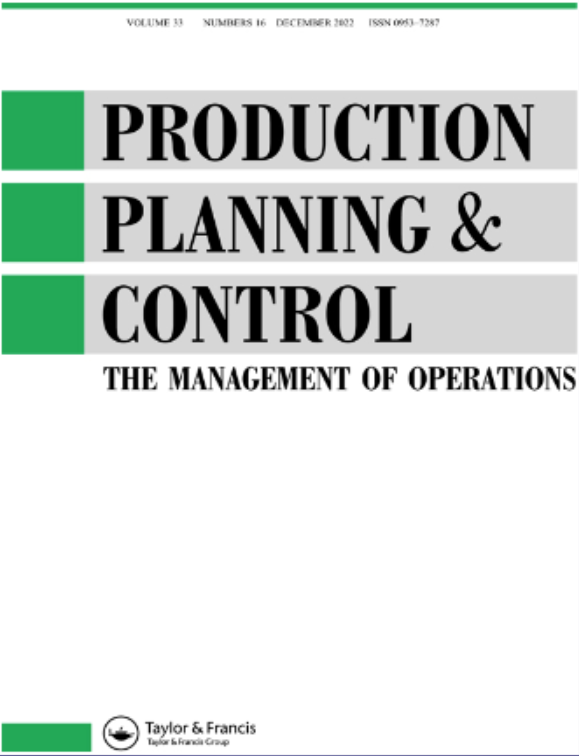可持续供应链框架,通过工业4.0克服向循环经济过渡的风险
IF 5.4
3区 管理学
Q1 ENGINEERING, INDUSTRIAL
引用次数: 36
摘要
从线性经济到循环经济(CE)的过渡对于可持续供应链来说是一个具有挑战性的过程,需要创新的过程方法和技术来应对所涉及的风险。工业4.0原则具有实现最佳可持续供应链解决方案的巨大潜力,并有望通过提高效率和资源利用率为可持续供应链运营增加价值。因此,工业4.0通过提高供应链管理的效率和可持续性来支持公司向CE过渡。因此,本文的目的是研究从线性到CE过渡的潜在风险,并从可持续供应链的运营管理角度提出基于工业4.0的应对措施。该研究是在土耳其的一家物流公司实施的。采用基于模糊层次分析法的综合多准则决策(MCDM)方法,运用TODIM方法分析风险与对策之间的关系。根据调查结果,基于工业4.0的最重要的响应是跨职能协作的集成业务流程,简化和标准化的模块化流程,以及通过大数据和分析对整个供应链的成本和绩效进行持续监控。本研究可以通过基于工业4.0的响应,帮助管理者在从线性到CE的转变过程中管理供应链运营中的风险。本研究的主要贡献是更好地理解了从线性经济向循环经济过渡的相关风险,并提出了基于工业4.0的对策建议,作为在可持续供应链背景下克服这些风险的手段。本文章由计算机程序翻译,如有差异,请以英文原文为准。
Framework for a sustainable supply chain to overcome risks in transition to a circular economy through Industry 4.0
Abstract Transition from a linear to a circular economy (CE) is a challenging process for a sustainable supply chain, and innovative process approaches and technologies are needed to deal with the risks involved. Industry 4.0 principles have great potential to achieve optimal sustainable supply chain solutions and are expected to add value to sustainable supply chain operations by increasing efficiency and resource utilisation. Therefore, Industry 4.0 supports companies transitioning to a CE through improving the efficiency and sustainability of their supply chain management. Thus, the purpose of this paper is to investigate the potential risks of the transition from a linear to a CE, with proposed Industry 4.0-based responses from an operations management perspective within the sustainable supply chain. Implementation of the study was conducted in a logistics company in Turkey. An integrated MCDM (Multi-criteria Decision Making) approach was based on Fuzzy AHP, and TODIM was used to analyse the association between risks and responses. According to the findings, the most important Industry 4.0-based responses are the integrated business processes for cross-functional collaboration, modular processes for simplification and standardisation, and continuous monitoring of the cost and performance throughout the supply chain by big data and analytics. This study may assist managers in managing risks in supply chain operations during the transition from a linear to a CE through Industry 4.0 based responses. The main contribution of this study is a greater understanding of the risks related to the transition from a linear to a circular economy, and proposals for Industry 4.0-based responses as a means of overcoming these risks in a sustainable supply chain context.
求助全文
通过发布文献求助,成功后即可免费获取论文全文。
去求助
来源期刊

Production Planning & Control
管理科学-工程:工业
CiteScore
19.30
自引率
9.60%
发文量
72
审稿时长
6-12 weeks
期刊介绍:
Production Planning & Control is an international journal that focuses on research papers concerning operations management across industries. It emphasizes research originating from industrial needs that can provide guidance to managers and future researchers. Papers accepted by "Production Planning & Control" should address emerging industrial needs, clearly outlining the nature of the industrial problem. Any suitable research methods may be employed, and each paper should justify the method used. Case studies illustrating international significance are encouraged. Authors are encouraged to relate their work to existing knowledge in the field, particularly regarding its implications for management practice and future research agendas.
 求助内容:
求助内容: 应助结果提醒方式:
应助结果提醒方式:


